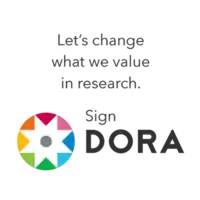San Francisco Declaration on Research Assessment
The San Francisco Declaration on Research Assessment (DORA) intends to halt the practice of correlating the journal impact factor to the merits of a specific scientist's contributions. Also according to this statement, this practice creates biases and inaccuracies when appraising scientific research. It also states that the impact factor is not to be used as a substitute "measure of the quality of individual research articles, or in hiring, promotion, or funding decisions".[1]
 | |
| Formation | 13 May 2013 |
|---|---|
| Headquarters | International organization |
| Leader | Stephen Curry, Imperial College London |
| Website | sfdora |
The declaration originated from the December 2012 meeting of the American Society for Cell Biology, and was published on May 13, 2013, signed by more than 150 scientists and 75 scientific organizations.[1][2] The American Society for Cell Biology states that, as of 30 May 2013, there were more than 6,000 individual signatories to the declaration and that the number of scientific organizations "signing on has gone from 78 to 231" within two weeks.[3] As of 14 December 2017, the number of individual signatories has risen to over 12,800 and the number of scientific organizations to 872.[4] Some organization signatories in 2017 include the British Library, Nature Research, BioMed Central, Springer Open and Cancer Research UK.[5]
Motivation
On 16 December 2012, a group of editors and publishers of academic journals gathered at the Annual Meeting of The American Society for Cell Biology in San Francisco to discuss current issues related to how the quality of research output is evaluated and how the primary scientific literature is cited.[6]
The motivation behind the meeting was the consensus that impact factors for many cell biology journals do not accurately reflect the value to the cell biology community of the work published in these journals. The group therefore wanted to discuss how to better align measures of journal and article impact with journal quality.
All the above considerations also extend to other fields and the organizers consider DORA "a worldwide initiative covering all scholarly disciplines". In fact, the declaration has been signed by scientific associations with general scope (such as the American Association for the Advancement of Science and the Academy of Sciences of the Czech Republic), by more specialized associations working in fields quite removed from biology (such as the European Mathematical Society, Geological Society of London, and Linguistic Society of America), as well as by some universities and other general institutions (such as the Higher Education Funding Council for England).
The outcome of the meeting and further discussions was a set of recommendations that is referred to as the San Francisco Declaration on Research Assessment, published in May 2013.[6]
Signatories
As of 3 May 2021, 2203 organisations and 17,354 individuals had signed the declaration, including universities, research institutes, learned societies and funding bodies from around the world.[7] On 20 May 2020 Springer Nature became the largest research publisher to sign the declaration.[8]
Implementation
In November 2019, Dutch universities and research funders announced the introduction of a new system of research recognition and reward, based on the DORA principles.[9]
In November 2019, in the context of its roadmap for open science, the French national research agency CNRS announced the introduction of a system of individual assessment of researchers based on the DORA principles.[10]
In March 2021, in the context of a reorganization, the university of Liverpool used the field-weighted citation-impact metric for determining which faculty jobs were at risk of being cut. This happened although that university was a signatory of DORA. This prompted the DORA organization, as well as the authors of the Leiden Manifesto, to contact the university for raising concerns.[11]
In June 2021, Utrecht University announced that it would no longer use the impact factor in hiring and promotion decisions. This decision was partly inspired by the DORA declaration, which the university had signed in 2019.[12]
References
- Alberts, Bruce (May 17, 2013). "Impact Factor Distortions". Science. 340 (6134): 787. Bibcode:2013Sci...340..787A. doi:10.1126/science.1240319. PMID 23687012.
- Van Noorden, Richard (May 16, 2013). "Scientists join journal editors to fight impact-factor abuse". Nature News Blog.
- Fleischman, John (May 30, 2013). "Impact Factor Insurrection Catches Fire with Over 6,000 Signatures and Counting". The American Society for Cell Biology.
- "Dora - ASCB". ASCB. Retrieved 14 December 2017.
- "Dora - ASCB". ASCB. Retrieved 2017-05-01.
- Cagan, R. (2013). "San Francisco Declaration on Research Assessment" (PDF). Disease Models & Mechanisms. 6 (4): 869–870. doi:10.1242/dmm.012955. PMC 3701204. PMID 23690539.
- "Signers – DORA". sfdora.org. Retrieved 2021-05-03.
- "Springer Nature enticed by DORA aura". Research Information. Retrieved 2020-06-09.
- "Dutch universities and research funders move away from the impact factor". ScienceGuide. 18 November 2019. Retrieved 22 November 2019.
- "Feuille de route du CNRS pour la science ouverte" (PDF). Retrieved 27 November 2019.
- Else, Holly (2021-03-25). "Row erupts over university's use of research metrics in job-cut decisions". Nature. Springer Science and Business Media LLC. 592 (7852): 19. Bibcode:2021Natur.592...19E. doi:10.1038/d41586-021-00793-7. ISSN 0028-0836. PMID 33767466.
- Woolston, Chris (2021-06-25). "Impact factor abandoned by Dutch university in hiring and promotion decisions". Nature. Springer Science and Business Media LLC. 595 (7867): 462. Bibcode:2021Natur.595..462W. doi:10.1038/d41586-021-01759-5. ISSN 0028-0836. PMID 34172959. S2CID 235647170.
Further reading
- John Bohannon (June 2016). "Hate Journal Impact Factors? New study gives you one more reason". Science Magazine.
- Simons, K. (2008). "The Misused Impact Factor". Science. 322 (5899): 165. doi:10.1126/science.1165316. PMID 18845714.
- Archambault, Éric; Vincent Larivière (2009). "History of the journal impact factor: Contingencies and consequences" (PDF). Scientometrics. 79 (3): 635–649. doi:10.1007/s11192-007-2036-x. S2CID 378976. Archived from the original (PDF) on 2013-05-31.
- Andrew Plume (3 June 2013). San Francisco Declaration on Research Assessment (DORA) – Elsevier’s view. A commentary on DORA by the Associate Director – Scientometrics & Market Analysis of major scientific journal publisher Elsevier.
- Curry, Stephen (2016). "Who's afraid of DORA?". Research Fortnight. Retrieved 14 December 2017.
- IEEE (2018). "The Culture of 'Publish or Perish' Is Hurting Research". The IEEE Institute.